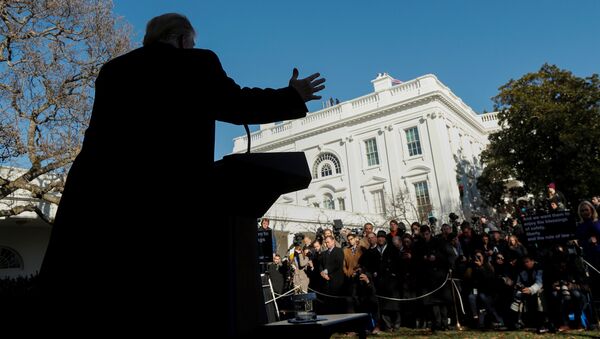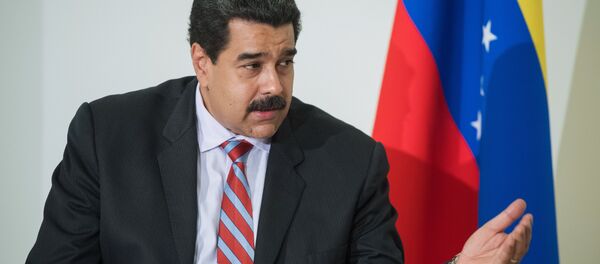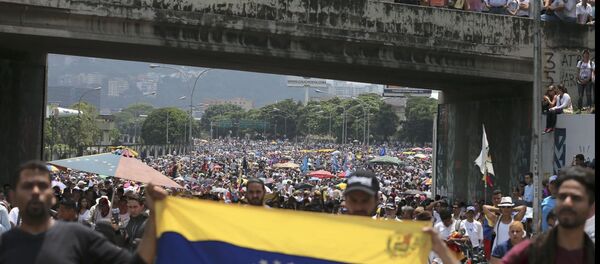Sputnik discussed the latest developments in Venezuela with Wayne Madsen, an investigative journalist based in the US.
READ MORE: Maduro: 'No Aggressor Will Enter Venezuela,' Trump's Military Option 'Madness'
Sputnik: What's your take on the decision made by major European states to recognize Guaido as the country's interim president?
Wayne Madsen: Well I'm not surprised, if you look back at what happened in 2002, there was an unsuccessful attempt by the United States to overthrow President Maduro's predecessor Hugo Chavez and that was not successful. The US found some guy, like they did with Guaido, they found the head of the Venezuelan Chamber of Commerce, and said this is the new president, totally unelected. Initially many European country supported that effort, keeping in mind that this was prior to the US invasion of Iraq, which also had the support of the same countries. So this isn't surprising, but if you look at countries like Mexico, Bolivia, Cuba and others, especially in the English-speaking Caribbean states, they still supporting the legitimate president of Venezuela, Nicolas Maduro.
Sputnik: We've been hearing the European Union saying that they categorically reject a military intervention in Venezuela as an option to resolve the crisis there, the Spanish foreign minister has been saying this, but would they need military force?
Wayne Madsen: I think what they're looking at is, when Trump says he's going to send aid to refugees […] the US is looking at the countries on the border of Venezuela, Colombia and Brazil, as staging grounds for some sort of intervention. It may not be with US troops but it could be with arming Venezuelan opposition forces, and of course they're looking for a revolt in the Venezuelan military, which, of course, has not happened and I'm wondering if it ever will. That's the strategy of the CIA right now, to see if they can get some Venezuelan military commanders to join the opposition against President Maduro, and those actions would obviously be launched from border regions, in Colombia and Brazil.
READ MORE: Journalist: US Would Be Willing to Move Ahead with Military Action in Venezuela
Sputnik: What's your take on the proposals to hold early elections in Venezuela? How economically sufficient would it be to hold a new ballot?
Wayne Madsen: President Maduro has indicated he is interested in that; let's see how interested the US-supported opposition is in accepting any proposals to defuse the situation. You know, the economic situation wasn't brought on by President Maduro, it was brought on by previous US administrations which economically strangled Venezuela through embargoes and all kinds of other actions against the Venezuelan economy, it's the same strategy being used now against Nicaragua and Cuba too.
Unfortunately, with sanctions and embargoes, the people that suffer the most are the Venezuelan people; obviously, there are shortages of basic commodities and it's also affected the Venezuelan oil industry, where they're hamstrung as far as exports are concerned. So we saw his power grab, of course, of the Venezuelan state oil company's major asset in the United States — Citgo, the gasoline company, and Venezuela, what can they do? They can try to take the US to the World Court, but that's a little too late at this point in time with the problems we see in the country, in Venezuela.
Sputnik: For the man on the street who doesn't really know much about Venezuela except for the fact that it's the country with the largest-known oil reserves, it is mind-boggling that it's plagued by so many economic woes, so how could we break down for our listeners what factors are at the core of Venezuela's economic troubles?
As far as the person on the street is concerned, as far as US public opinion, I would just point people to the fact that Trump said he doesn't want to engage in regime change, and now he has Mr. regime change, John Bolton, and another pro-regime change Secretary of State Mike Pompeo as his two major advisers. So the guy who was against regime change is now going to be known as 'president regime change' because of the people he's surrounded himself with.
READ MORE: Lima Group Agrees to Ban Venezuelan Officials from Entering Members' Territory
Sputnik: Obviously Guaido was groomed, it's a no brainer, groomed for the task at hand, if he becomes president as the West persists, will he be able to resolve these economic problems quickly?
Wayne Madsen: Let's see how much the US is willing to come to his aid economically with all the other issues this country has. We will see it if it happens, but one thing, if he becomes president, is how will they treat the 'Chavistas', the pro-Hugo Chavez people in Venezuela? There are still many, especially those who were living in those very poor barrios, these slums; Chavez and Maduro increase their living standards. If he starts revenge against the Chavistas, then we're talking about the situation that once took place in Columbia and may happen again with the FARC, the left-wing gorillas, they went into the mountains they fought the Colombian government for years, and now it looks like this peace agreement may be on the rocks, with this President Duque who is an extreme right-winger tied to the narcotics warlords, druglords in Colombia. We will see what kind of an attempt there is to reach out to the Chavistas, just the common poor person in Venezuela, that's seen their lifestyle improve because of Chavez's and Maduro's policies, which unfortunately have been affected by this US economic warfare against the country.
The views and opinions expressed by the speaker do not necessarily reflect those of Sputnik.






